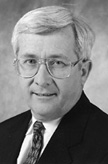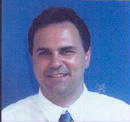 |
Huston |
Whether the goal is constructing a 10-story building or protecting an investigator’s future research discovery, it’s important to lay a solid foundation, say Dick Huston, Ph.D., and Leonard Agneta, J.D.
From UNMC’s Intellectual Property Office (IPO), Dr. Huston and Agneta interact with UNMC researchers to capture, evaluate and protect intellectual property so it can be licensed.
“It’s a matter of planning and protecting future intellectual property that will lead to important and significant patents,” said Agneta, UNMC patent attorney and special assistant general counsel for intellectual property (IP). “It’s a terrible surprise to find out that IP ownership has been unwittingly given away.”
 |
Agneta |
“The importance of IPO’s role starts early — long before a patent is even considered,” said Dr. Huston, IPO director and assistant dean for research. “We can advise investigators and tell them ‘you’ll be giving away future rights to this invention or material,’ or help them retain rights before they either publish data about their invention or send research materials to another institution or collaborator. We look for ways to complement their research goals while protecting the University’s IP.”
Quarterly newsletters available
In an effort to better educate the campus, the IPO is working with Uventures, Inc., a tech transfer information provider serving both the non-profit and private sectors to distribute the first of a series of quarterly newsletters. The first issue is now available on IPO’s Web site (http://unmc.edu/ipo/). The newsletter will outline intellectual property issues to help investigators understand the technology transfer process protects their inventions.
“IPO has critical role” for UNMC researchers
“The IPO has a critical role in the ultimate outcome of basic and clinical research,” said James Talmadge, Ph.D., professor in UNMC’s department of pathology and microbiology and director of the Laboratory of Transplantation Immunology. “Regardless of the potential clinical value of a discovery, without patenting it it is unlikely to be developed and will be lost to clinical utility. The IPO at UNMC has made significant progress recently and has the potential to provide the needed support for research in Nebraska.”
Overall, about one third of UNMC’s 700 faculty members are involved in funded research, Dr. Huston said. “Each year yields about 30 invention disclosures or one disclosure per $1.6 million of total annual research expenditures. This ratio compares favorably with UNMC’s peer group of research universities.” IPO is responsible for implementing the invention disclosure and evaluation process, interpreting UNMC IP policies and providing a stimulous for attracting funding to support UNMC research and education.
Protecting one’s rights
To protect the rights to UNMC inventions, researchers should contact the IPO as early as possible prior to a public disclosure. Public disclosure includes journal articles, publications on the Web, conference abstracts and oral presentations or poster presentations. Foreign patent rights are lost immediately upon public disclosure. The United States allows inventors one year from the date of the public disclosure to file a patent application.
Located on the second floor of the Campus Training Center, the IPO is across the hall from UNeMed, which assists the university in the licensing and commercialization of intellectual property. UNeMed’s licensing opportunities begin after the IPO has evaluated the invention and considered appropriate protection strategies.
“If rights aren’t properly captured by UNMC, there is less chance for commercial success later on,” Agneta said. “Without the proper foundation, perceived success may later be undermined.”
The first stop for IP issues
The IPO works closely with UNMC’s Sponsored Programs and Clinical Trials Office. “We’re the first stop for intellectual property issues,” Dr. Huston said. “We evaluate disclosures, answer to governmental reporting regulations and sort out prior contractual obligations that might impact any new invention such as those contained in material transfer or confidentiality agreements.”
The office also works with UNMC’s Technology Evaluation Protection Committee (TEPC) to decide whether or not to file patent applications. In making their decision, the committee looks at the value of the invention, its protectability and its commercial merit.
“The earlier we can get involved in the process the better advice we can give to faculty members as they build their research programs,” Dr. Huston said.
For more information
For more information call the IPO at (402) 559-2170 or visit their Web site at http://unmc.edu/ipo/.